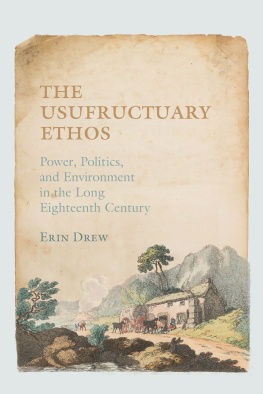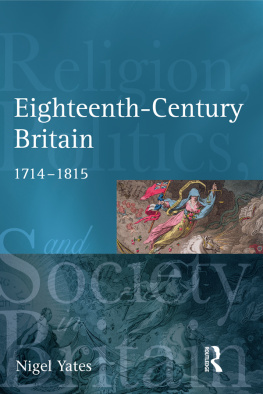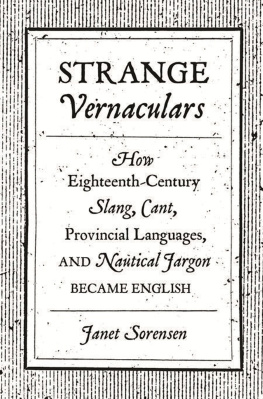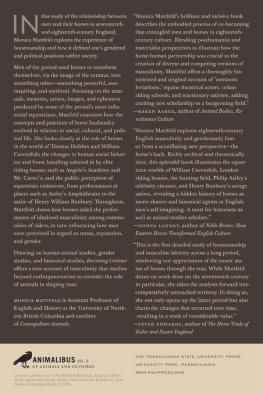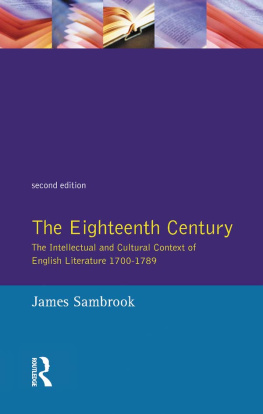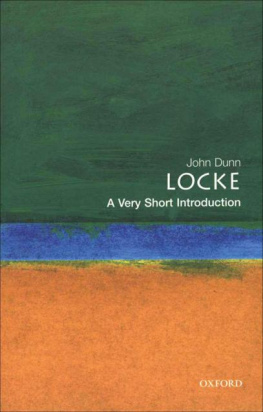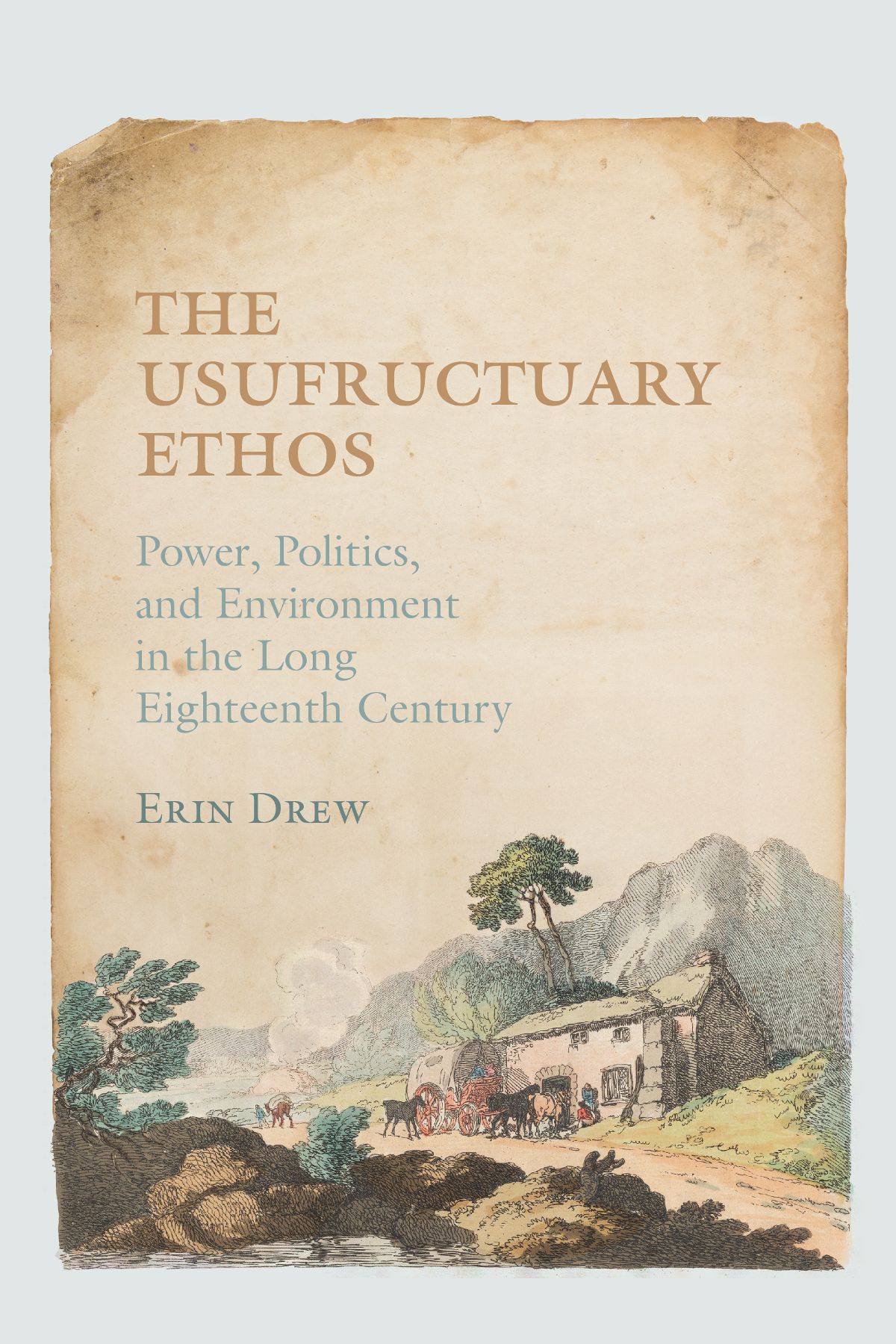
Winner of the Walker Cowen Memorial Prize for an outstanding work of scholarship in eighteenth-century studies
The Usufructuary Ethos
Power, Politics, and Environment in the Long Eighteenth Century
Erin Drew
University of Virginia Press
CHARLOTTESVILLE AND LONDON
University of Virginia Press
2021 by the Rector and Visitors of the University of Virginia
All rights reserved
First published 2021
Library of Congress Cataloging-in-Publication Data
Names: Drew, Erin E., author.
Title: The usufructuary ethos : power, politics, and environment in the long eighteenth century / Erin Drew.
Description: Charlottesville : University of Virginia Press, 2021. | Includes bibliographical references and index.
Identifiers: LCCN 2020051266 (print) | LCCN 2020051267 (ebook) | ISBN 9780813945798 (hardcover ; acid-free paper) | ISBN 9780813945804 (paperback ; acid-free paper) | ISBN 9780813945811 (ebook)
Subjects: LCSH: Environmentalism in literature. | Literature and societyGreat BritainHistory18th century. | Literature and societyGreat BritainHistory17th century. | NatureEffect of human beings onGreat Britain. | EcocriticismGreat Britain.
Classification: LCC PR448.E58 D74 2021 (print) | LCC PR448.E58 (ebook) | DDC 820.9/36dc23
LC record available at https://lccn.loc.gov/2020051266
LC ebook record available at https://lccn.loc.gov/2020051267
Cover art: Plate 10, Outlines of Figures, Landscapes and Cattle... for the Use of Learners, Thomas Rowlandson, hand-colored etching, 1790 (The Metropolitan Museum of Art, NY, www.metmuseum.org, The Elisha Whittelsey Collection, The Elisha Whittelsey Fund, 1959); background, Sonate/iStock
Contents
Usufruct and the Eighteenth Century in Environmental Criticism
I n his 2016 book Dangerous Years: Climate Change, the Long Emergency, and the Way Forward, the political scientist and environmental activist David Orr proposes looking to a concept called usufruct and a series of eighteenth-century figures to understand the intergenerational responsibility demanded by the twenty-first centurys environmental crisis. Deriving from Roman property law, usufruct refers to the right of temporary possession, use, or enjoyment of the advantages of property belonging to another, so far as may be had without causing damage or prejudice. Orr muses:
Are there reasons persuasive and powerful enough to override the perceived self-interest of entire generations that would compel them to leave as much and as good for subsequent generations? A great deal depends on how we answer that question, so let me offer two and a half possible answers. The first is drawn from the great conservative Edmund Burke, who wrote, People will not look forward to posterity, who never look backward to their ancestors. In his view, a chain of obligation connects past, present, and future generations and when honored can help overcome the selfish temper and confined views of the presentthat is, it can work in our self-interest.
Within the eighteenth centurys usufructuary ideas, Orr suggests, lies a lesson about the responsibilities we have toward each other, the world, and the future that is congenial to our contemporary environmental concerns. Usufruct could provide a paradigm that balances use with sustainability, personal interest with public welfare, the demands of the present with the needs of the future.
What Orr did not realize was that an environmental ethos along the lines he describes long predated Jefferson and Burke. The Usufructuary Ethos recovers usufructs legacy as an influential way of understanding the moral relationship between humans and their environments in late seventeenth- and early eighteenth-century England. During this period, this book will demonstrate, usufruct appears as a common point of reference and comparison across philosophical, devotional, legal, and literary discussions of the ethical parameters of possession, use, and power. The way that usufruct positions possession as temporary and limited allowed writers to articulate the interlocking chains of obligation that made up their world: chains that linked not only past, present, and future but humans, nonhumans, and God, as well as the social, political, and natural worlds. Burke did not have the natural world in mind when he spoke of posterity in the sentence quoted by Orr, but the fact that his words apply so neatly to environmental ideas is less a coincidence than an echo of the legacy of the usufructuary socio-environmental ethos of earlier decades. Given that the usufructuary ethos was strongly associated with politically conservative writers such as John Evelyn, Anne Finch, and Alexander Popewriters dedicated to the political and moral centrality of the landed gentry and the land itselfBurkes late-century invocation of usufructuary ideas to defend conservative political ideologies indicates his debt to the usufructuary ethos. The Usufructuary Ethos re-centers the titular concept in late seventeenth- and eighteenth-century culture, and makes a case for it as an environmental ethic unique to that period in England.
I use the word ethos to describe this thread of early modern thought not only to illustrate the way that usufruct provided a set of guiding beliefs for a significant group of English writers but also to emphasize its ethical impetus and ramifications. The premise that humans had only usufruct of the earth, rather than full control or ownership of it, provided a framework for determining the best uses of the nonhuman world, not in terms of what sort of use was most productive, but in terms of what sort of use would best fulfill the users responsibilities to others, both human and nonhuman, in the present and future. Usufructuary discourse is therefore distinct from the better-known contemporaneous discourse of improvement, which sought to maximize the productive potential of the natural world through human innovation. Improvement was, of course, motivated in some cases by altruistic desires to eliminate dearth and improve life; but whatever the motivations of the individual practitioner, it was concerned with identifying the best ways for landowners to intervene in nature to improve its produce. In contrast, the usufructuary ethos places the human owner of land in the middle of a hierarchy, responsible to God for the natural gifts he has been granted (and which God retains ownership of), and responsible to other beings and future generations for passing along intact what they will need to survive. The usufructuary ethos sees the world as an interspecies, intergenerational network of obligation and dependence in which each organism carries moral significance.
Alongside usufruct, a network of other, associated legal metaphors such as steward, tenant, and landlord took on specific significance within the discourse of the usufructuary ethos. These terms share a few crucial commonalities. First, they describe hierarchical relationships organized around property. The usufructuary, the trustee, and the steward all have in common the fact that they wield power over property that does not belong to them. They also have moral and fiduciary obligations to that propertys current and future owners to maintain and care for it. These figures are, therefore, doubly medial: in the middle of a social and legal chain between proprietor and dependent, and in the middle of a temporal chain between past and future. Second, usufructuary, steward, tenant, and landlord are all terms for legal, social, and political relationships of power that were applied to relationships among nonhuman beings and God as well as to relationships among humans. What this reveals, I argue, is that the usufructuary ethos represented a moral framework that applied to all aspects of existence, natural and social alike. Writers used analogies borrowed from nature as evidence for moral obligations in the social world, and vice versa; this was evidence, not of an attempt to impose human mastery over nature, but rather of the conviction that moral obligations to both nature and other humans derived from the same source.
Next page
